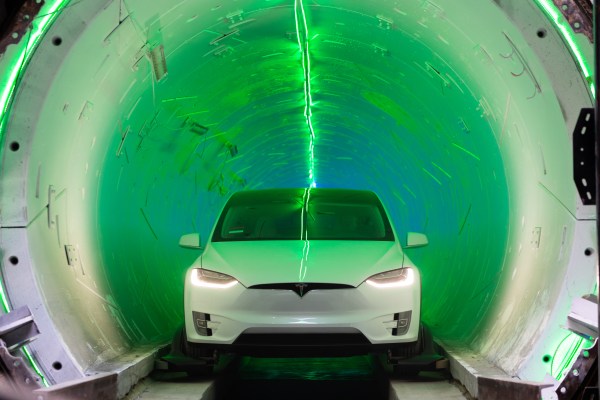The Boring Company (TBC), Elon Musk’s tunneling and transportation startup, has landed a $48.7 million project to shuttle people in an underground Loop system around the Las Vegas Convention Center.
This is the company’s first commercial contract.
The initial design for the project, dubbed Campus Wide People Mover, or CWPM, will focus on the Las Vegas Convention Center, which is currently in the midst of an expansion that is expected to be completed in time for CES 2021. The newly expanded Las Vegas Convention Center will span about 200 acres once completed. The Las Vegas Convention and Visitors Authority (LVCVA)estimates that people walking the facility would travel two miles from one end to the other, a distance that prompted officials to find a transportation solution.
In March, the LVCVA recommended that the Boring Company be selected. The board of the LVCVA voted Wednesday to approve the contract.
The approval comes with numerous strings and requires TBC to achieve specific milestones, details of which The Guardian published earlier this month. The contract withholds over two-thirds of payments until construction is complete, and requires TBC to meet specific ridership goals.
The LVCVA estimated an initial $1.2 million outlay to TBC in fiscal year 2019, following by $15 million in 2020 and the final $32.47 million in 2021.
While the project is limited for now, TBC has said in the past that the project could someday connect downtown, the Las Vegas Convention Center, the Las Vegas Boulevard Resort Corridor and McCarran International Airport.
This underground people mover will involve the construction of twin tunnels for vehicles and one pedestrian tunnel, according to contract documents. The twin tunnels are expected to be less than a mile. There will be three underground stations for passenger loading and unloading and an elevator or escalator system for passenger access to each station.
The people mover, once completed, is supposed to whisk people between stops at high speeds in modified electric Tesla vehicles. The contract describes these as autonomous vehicles. (Today, Tesla vehicles are not self driving, and instead have an advanced driver assistance system that handles certain tasks on highways such as lane steering and adaptive cruise control.) Before it opens to the public, the contract dictates that TBC test the system for three months.
As Musk’s Boring Company lands one contract, safety concerns have been raised on the design of another more ambitious Loop system from Washington, D.C. to Baltimore.
Details of the 35.3-mile system, which emerged recently in a 505-page draft environmental assessment, reveals a design that fails to meet several key national safety standards. The underground system appears to lack sufficient emergency exits, ignore the latest engineering practices and proposes passenger escape ladders that one fire safety professor calls “the definition of insanity.”
